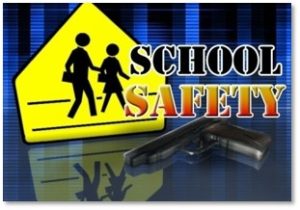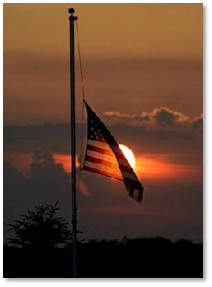 It has taken me some time to process the latest school shooting and figure out what I want to say. Also, how to say it. So here, in the aftermath of our 35th school shooting since Columbine, are the things I don’t want to hear any more—and a few things I would like to start hearing.
It has taken me some time to process the latest school shooting and figure out what I want to say. Also, how to say it. So here, in the aftermath of our 35th school shooting since Columbine, are the things I don’t want to hear any more—and a few things I would like to start hearing.
Five Things I Don’t Want to Hear About a School Shooting:
- The name of the shooter. I already know that he will be (1) male, (2) white, (3) young, (4) angry, (5) a U.S. citizen, (6) known as a scary creep to his classmates and few acquaintances but no friends, (6) in love with guns. He had an AR-15 military-grade assault weapon. His name is irrelevant. The news media should call him SK18, for school killer #18. Don’t put his name on the news. Don’t give him any attention or notoriety, don’t set his murders up as a new record that some other angry young man will try to break in a few weeks or months.
- The motive of the shooter. We know it’s going to be one of a very short list of reasons and we have heard them all before. The motive doesn’t matter. Only the method and the opportunity count—and, as a country, we would rather not think about that. So spare me the sob story about what drove a privileged white kid to kill his classmates and teachers.
 Thoughts and prayers from recipients of NRA donations. If you hold public office and you have taken money from the National Rifle Association, I don’t want to hear anything you have to say. I particularly don’t want to hear about your thoughts and prayers on the news, on Facebook, in a Tweet, or in a newspaper. This is so much sanctimonious drivel because (a) you don’t really pray and (b) you think only about yourself.
Thoughts and prayers from recipients of NRA donations. If you hold public office and you have taken money from the National Rifle Association, I don’t want to hear anything you have to say. I particularly don’t want to hear about your thoughts and prayers on the news, on Facebook, in a Tweet, or in a newspaper. This is so much sanctimonious drivel because (a) you don’t really pray and (b) you think only about yourself.
If I met you face to face, I would ask you where, exactly, did you pray? Did you go to a church or some other house of worship? Did you kneel beside your bed? Did you cram those prayers into one Congressional moment of silence? If I could hear your prayers, I suspect that they would sound like this: “Please, Lord, protect me from the wrath of my constituents whose children were murdered this day. Protect me from the torches and pitchforks they might bring to my home in their anger. And please, please keep the NRA money flowing into my campaign.”
- That the shooter is mentally ill: He might be and we should do something about that. Or he might have gotten all ramped up watching too many violent movies and videos. Or he wants revenge on the school that expelled him or the students who bullied him. Or he wants his big day in the news. If only mentally ill people committed murder, we would have more asylums and mental hospitals than prisons, instead of the other way around. Should we assume that America is the only country with mentally ill people? Because no other wealthy nation suffers from such school shootings.
Besides, if you, Mr. GOP politician, think that only mentally ill men commit school shootings, why did you vote last year to allow mentally ill people to buy guns? And why did you also vote to cut back on healthcare funding for mental patients?
- The screams of the victims. This one popped up on NPR’s Morning Edition today and I changed the station. If you aren’t going to do anything to fix this national disgrace, I don’t want to listen to the latest group of innocent people screaming in terror as their ordinary day turns into their last minutes on earth. This is not news, it’s terror porn.
Got that? Okay, let’s move on.
What I Do Want to Hear from the Media
 Whenever a school shooting happens, people ask how we can stop them. Well, here are six real suggestions for the news media. Whether print, broadcast or online, the media can do a lot to help. They can:
Whenever a school shooting happens, people ask how we can stop them. Well, here are six real suggestions for the news media. Whether print, broadcast or online, the media can do a lot to help. They can:
- Not broadcast the name of the shooter. See #1 above. Give him no publicity, no notoriety, no fame. Make him invisible. This is not a new suggestion: many people have pointed out the negative effects of naming shooters. They are all listed on dontnamethem.org. The most prominent concern is the “Contagion Effect” that drives copycat shootings. Yet on this morning’s news I heard the usual breathless announcement, “They have identified the killer. His name is . . .” I’m looking at you, Chris Cuomo.
- Limit the air time you give to the tragedy. Dedicating a lot of time to the shooting, as CNN is wont to do, showing videos of students running out of the school, interviews with survivors, interviews with impotent police captains, interviews with politicians, etc. only enlarges this shooter’s importance and serves as an incentive to the next one.
- Name the enablers. List the names of local politicians who took money from the NRA and how much their campaign banked to emasculate our gun laws, feeble as they are. Also, how they voted on gun availability, background checks, safety and training laws. They have as much part in each of these tragedies as the families and friends who saw the warning signs and did nothing.
Expose the Gun Violence Problem
Here are three other things the media can do:
- Expose the depth of the problem. Dedicate a segment every night to someone who died by gunfire that day. This shouldn’t pose a difficult problem: 30 people a day die from gunshots in the United States. And there are so many varieties of gun violence to choose from: a woman killed by abusive spouse or boyfriend, a child who shoots himself or someone else, a suicide, or an accident, a traffic altercation, a bar fight. They happen every day. Every day.
 Most people have no visibility to these tragedies because our society has conspired to make them invisible. You have to link to a site like Everytown for Gun Safety or Mothers Against Gun Violence to hear about them.
Most people have no visibility to these tragedies because our society has conspired to make them invisible. You have to link to a site like Everytown for Gun Safety or Mothers Against Gun Violence to hear about them.
During the Vietnam War, the networks broadcast images from the battlefield every night. This immediacy went a long way toward increasing opposition to the war. Now our schools have turned into battlefields.
- Make gun violence personal. Statistics may alarm people but numbers are, essentially, impersonal. Yet gun violence is very personal to families and survivors and personal experience motivates others. Let the people who have lost their loved ones or who have clung to life despite the shooter’s worst deeds talk about what this has meant to their lives.
- Show the carnage. Yes, I know this sounds macabre but, really, can you look at what bullets from an AR-15 do to a child’s body and remain unmoved? Can you see school children of any age lying in a pool of blood and not care? While gun violence remains all intellectual and philosophical, you can put it out of your mind and sleep soundly at night. But those pictures could keep you up and make you think.
My Thoughts and Suggestions
So those are my thoughts on the day after our 18th school shooting of 2018. I have no prayers but I do offer these suggestions as a way to stop another school shooting.
The most important thing, of course, is to show up at the polls in November and vote for candidates who support sensible ways to keep big, powerful guns out of the hands of the wrong people.
Until then, if you want to see what’s really happening in American every day, check out the following sites. There are many more.

Thanks Aline Kaplan, I try ^^It’s a ballancing act, but it’s very rewarding
Aline Kaplan, thanks! And thanks for sharing your great posts every week!
Thank you for reading and commenting. I appreciate everyone who spends time with The Next Phase Blog.
I so appreciate this post. Thank you, Aline. I particularly appreciate your point about other countries and mental illness. Our numbers of mentally ill people do not explain the national levels of horrific gun violence that we experience.